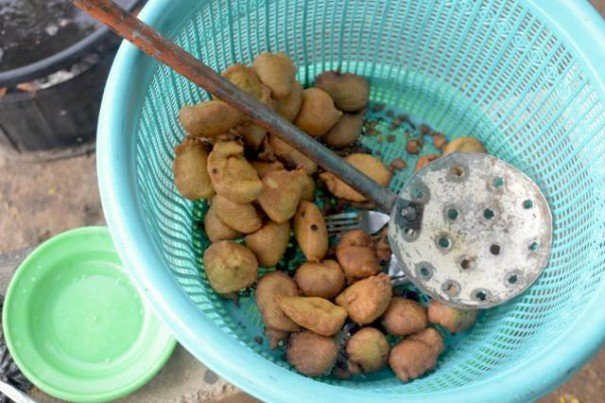
A Street‑Life Madeleine in the City of Hustle

A Street‑Life Madeleine in the City of Hustle
Akara in Abuja
There’s a radio program here in Abuja on 104.5 Crowder Love FM called Brekete Family. Near the beginning of the program, its charismatic presenter, Ordinary Ahmad Isah, begins a chorus:
“Lazy man, wake up. Lazy woman, wake up. Lazy brother, wake up. Lazy sister, wake up … old age he come like thief.”
Nigeria isn’t a country for inactivity. Five minutes here and you’ll see more wheeler-dealing than five lifetimes in Manhattan or London could offer. To say there’s business happening twenty-four/seven neglects the extra hour every day Nigerians somehow manage to find for their hustle. Nigeria does not hang about.
If the sound of the rush hour in Abuja is Ahmad Isah and Brekete Family—a program that brings a voice to the voiceless of Nigeria by listening to their complaints and holding the relevant government department to account live on air—then the taste of the morning is akara.
Fried bean cakes that don’t look too exciting from the outside but taste oh yes so good within, akara are breakfast fuel in Nigeria and beyond. If you’re from Brazil, you’ll be familiar with their descendant acarajé.
Good akara are a simple, beautiful thing, though don’t underestimate the labor that’s gone into washing and peeling the black-eyed peas that are their main constituent. Crispy on the outside when hot, with a crunchy frill where they’ve been floating on the oil, their innards are soft, fluffy and ever so slightly spicy. Your fingers shine a little after eating them. It’s like a super rich sponge but all savory, no sweet; a street-life madeleine, maybe.
As I walk down my Abuja street in the morning, I see maybe ten or fifteen akara aunties down on their haunches or sitting on a tire or in the back of a car transformed into a food-is-ready (Nigeria’s self-explanatory name for a one-stop snack shop).
They’re all sitting with low bowls of hot oil in front of them over little wood fires. The akara are merrily bobbing around, turning their trademark orange; the aunties occasionally poke them with a stick to ensure even bronzing.
Just 10 naira (five cents) buys four cakes at my nearest akara auntie’s stall, which is inauspiciously wedged between an overflowing rubbish bin and an ATM. Make sure you ask for cakes freshly fished from the oil, not those sitting around looking unloved. She’ll sling them into a thin black plastic bag and they’re yours to eat in (there’s a plank on bricks next to the bin for seating) or to take away. You’ll try and eat them as you’re walking along, bag swinging from your wrist, but the heat allows only the smallest nibble at a time.
A warning: more than five minutes after manufacture, you have missed out on most of the point of them. Needs must have fresh akara. So order fast, grab a bag and eat up, my friend. Old age he come like thief.